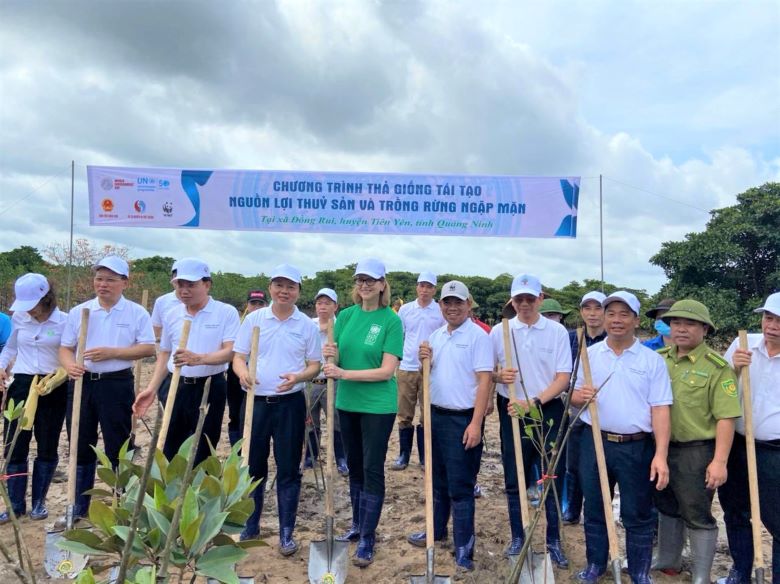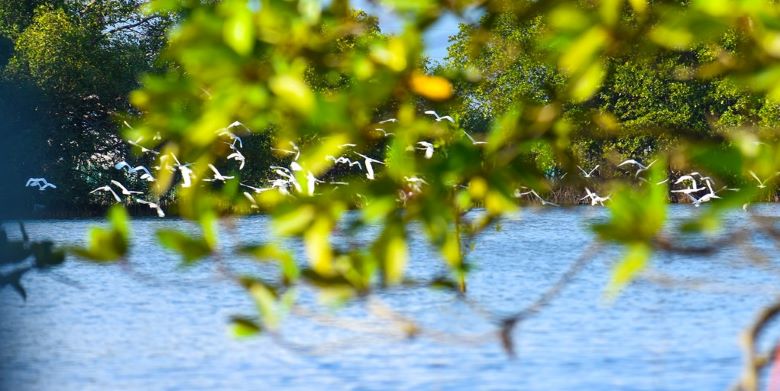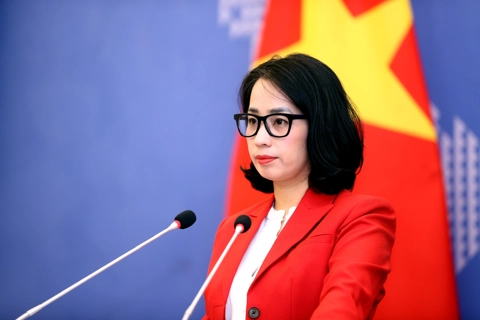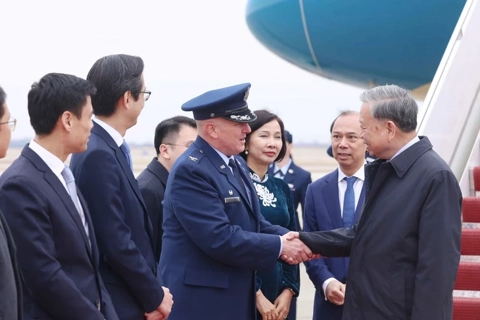Vietnam needs “green climate Doi Moi”: UNDP
Given net-zero commitments, Vietnam is now at a crossroads to transform routes that benefit both the economy and the environment.
Vietnam’s climate commitment at COP26 requires development pathways to ensure the balance of both economy and environment that the United Nations Development Program (UNDP) called reforms.
| UNDP Resident Representative Caitlin Wiesen at the ceremony held in Quang Ninh Province on May 28. Photos: UNDP |
Vietnam would need a “Green Climate Doi Moi” to enable a green and inclusive economic rebound from Covid-19 as the country strives for a high-income level by 2045, while safeguarding the natural resources and environment for future generations, Caitlin Wiesen, UNDP Resident Representative, said today.
This includes green, climate-resilient approaches to technology, capital markets, supply chains, business models, and the engagement of SMEs in innovation, Wiesen said at a national launching ceremony held on May 28 in response to World Environment Day (June 6) and to celebrate International Day on Biodiversity (May 22)
To support Vietnam’s low-carbon journey, Vietnam should focus on four key pillars as Wiesen recommended, namely just energy transition, ocean economy, natural resources management and biodiversity conservation, and innovative long-term financing.
One of the top government priorities is a just energy transition. Vietnam’s robust economic growth requires an even higher growth in energy production. With great potential for renewable energy, especially offshore wind, expanding renewable energy will help to sustainably power the economy, increase energy security and transform many other economic sectors into green development pathways, for example, the transport sector.
However, there are several practical impediments to achieving a green and just transition, such as the legal framework of electricity; transmission system; regional markets; and securing financing.
For that reason, the UN and UNDP stand ready to support Vietnam in the Just Energy Transition, including the phase-out of coal highlighted during the recent exchange between the Prime Minister Pham Minh Chinh and UNDP Administrator Achim Steiner and the letter from the UN Secretary General António Guterres and Prime Minister Chinh, according to Wiesen.
The ocean economy is vital for the sustainable economy in Vietnam. The blue economy, which UNDP has been working with Vietnam in initiating important steps, contributes to climate change mitigation by developing offshore renewable energies, decarbonizing maritime transport, and greening ports.
Also, developing green infrastructure in coastal areas will help preserve biodiversity and landscapes, while bringing about benefits to the coastal economy, including tourism. Marine spatial planning is essential to provide a framework for the sustainable use of natural resources and ecosystem services derived from the sea areas.
It is also critical for enhancing global action to address plastic pollution, and accelerating progress toward an international legally binding instrument on plastic pollution to prevent and reduce the environmental impact of plastic pollution in line with the United Nations Environment Assembly Resolution on ending plastic pollution.
Meanwhile, natural resources management and biodiversity conservation are aimed to protect various ecosystems from forests and wetlands to coral reefs. UNDP sees many opportunities for Vietnam to overcome the challenges that we are facing using nature-based solutions through reforestation, sustainable forest management, mangrove plantation and rehabilitation, and nature-based tourism.
Specifically, mangroves are among the most effective nature-based solutions; not only are they a source of sustainable livelihoods such as aquaculture and beekeeping, but they also contribute to carbon sequestration, biodiversity conservation, coastal protection, and water filtration.
They create a common benefit, both for reducing global climate change impacts and helping people to improve their livelihoods as well as increasing the forest cover rate in Vietnam.
In addition, securing innovative long-term financing for Vietnam’s decarbonization programs will be crucial for reaching carbon neutrality. International experience provides many examples of institutional and policy innovations to achieve this aim, including national development banks, various incubator programs, sovereign wealth funds, and green bonds.
| UNDP Resident Representative Caitlin Wiesen and Minister of Natural Resources and Environment Tran Hong Ha (4th left) in Quang Ninh. |
According to UNDP, Vietnam must introduce a transparent policy framework on green financing flows to support new green and resilient projects and investments. Both foreign direct investment (FDI) and domestic private sector finance are essential to support the achievements of the net-zero emission target by 2050.
In the short term, Vietnam’s immediate actions taken since COP26 include the establishment of a new National Committee for the implementation of Vietnam’s climate commitments. The draft National Climate Change Strategy is one of the key policy instruments to deliver the net-zero emission target by 2050 and to build community resilience.
In another move, UNDP will continue to support Vietnam in reviewing Nationally Determined Contribution, and the technical report of the National Adaptation Plan prior to COP27 in November this year, Weisen emphasized.
| A biodiversity zone in Quy Nhon, Binh Dinh, Vietnam. Photo: Zing |


.jpg)












